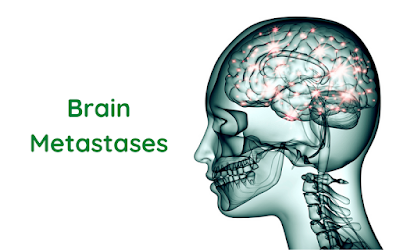What is Brain Metastases:
As any cancerous tumor grows, cancer cells can break away and be carried to the other organs of the body by the blood or lymphatic system. This is known as metastasis, or metastases when there are so many areas of spread. The metastatic brain tumors basically are the most common brain tumors.
Although brain metastases may begin due to any kind of cancer, the types that most commonly spread to the brain are as lung, breast and kidney cancers as well as melanoma.
When any new tumor starts spreading to the brain, it isn’t addressed as brain cancer. Rather, it’s named after the area in the body where cancer started. For instance, when lung cancer spreads to the brain is known as metastatic lung cancer.
Symptoms of brain metastases:
If cancer spreads to the brain may compress the brain and can be responsible for causing swelling inside the skull which leads to the headaches.
Brain metastases may also interrupt the electrical activity of the brain, causing numbness, seizures, tingling or speech problems. When a tumor interrupts the signals from the brain to the muscles, it may result in coordination problems.
Some other reported symptoms areas: personality changes, vomiting, rapid emotional changes, weakness and vision changes.
What are causes: Brain metastases basically occur when the cancerous cells travel through the bloodstream or the lymph system from the original tumor and spread to the brain. There they may start to multiply. Metastatic cancer spreads from its original location is known as primary cancer.
There are many theories about what causes some cancers in order to spread and why a few cancers travel to the brain. Brain metastases due to the lung cancer are often detected initial period of the disease, and those due to breast cancer develop late.
What are the risk factors: Any kind of cancer may spread to the brain, but having one of the following types of cancer may put you more likely at the increased risk of brain metastases:
- Lung cancer
- Colon cancer
- Breast cancer
- Kidney cancer
- Melanoma
How are brain metastases detected?
Brain metastases can be detected when the primary cancer is diagnosed. Or, if any patient has symptoms, a healthcare provider may recommend specific tests which basically depends on the symptoms. In order to detect brain metastases, tests may include:
- Computed Tomography (CT)
- Magnetic Resonance Imaging (MRI) Scans
Brain Metastases Treatment Options:
Metastases breast cancer treatment options for patients with the breast cancer brain metastases as: surgical resection, whole-brain radiation therapy (WBRT), stereotactic radiosurgery (SRS), chemotherapy and targeted therapy.
1. Surgery: Surgery can be considered as the first treatment for the metastatic brain tumors is tumor removal, or resection. A neurosurgeon: a surgeon who is specially trained in order to operate on the brain and spine will determine if the tumors can be surgically removed by observing patients health as well as status of the disease.
Some factors which may support surgery including a single tumor larger than the 3 cm, location outside of the speech or motor surrounding areas of the brain, and limited or somewhat stable disease in other organs of the body. Symptomatic tumors can be more likely removed by the surgery.
2. Chemotherapy: New research indicates that it may be an effective treatment modality for some patients. The use of chemotherapy basically depends on the status of the systemic disease, size of the tumor, primary site and number in the brain, existing medication, and previous history of the chemotherapy treatment, if any.
- Recent studies demonstrate that a few tumors can be sensitive to drug therapy. SCLC, breast cancer, lymphoma and germ-cell tumors are among these tumors. Some new targeted agents for the metastatic breast cancer (lapatinib 250 mg together with the capecitabine 500 mg), non-small cell lung cancer (EGFR inhibitors, ALK inhibitors) and melanoma (Mek and BRAF inhibitors) are useful for the brain metastases from these particular cancers.
- The emerging existence evidence of the immunotherapy (ipilimumab, pembrolizumab, nivolumab) in patients with brain metastases from the NSCLC and melanoma.
- Intra-CSF chemotherapy (drugs placed within the brain or spine water compartment) may be used for leptomeningeal metastases cancerous cells that metastasize to the covering layers of the brain and spinal cord.
Chemotherapy breast cancer medication can be combined with other therapies such as radiation. Some tumors that are sensitive to chemotherapy in other parts of the body may become resistant to the chemotherapy once in the brain.
3. Radiation Therapy: Radiation therapy can be used to treat single or multiple brain metastases. It can be used in order to treat a metastatic brain tumor, in order to help prevent the brain metastases in those people who are newly diagnosed with the small-cell lung cancer or acute lymphoblastic leukemia.
A few types of cancer are quite responsive to the radiation than others. Small-cell lung tumor and germ-cell tumors are highly sensitive to radiation, other types of lung cancer and breast cancers are moderately sensitive, and melanoma and renal-cell carcinoma are less sensitive.
Medication: High-dose corticosteroids can be used in order to ease the swelling around the tumors and decrease the neurological symptoms. Medications like paclitaxel 100 mg and gefitinib 250 mg also can be recommended for metastases brain tumor.

No comments:
Post a Comment